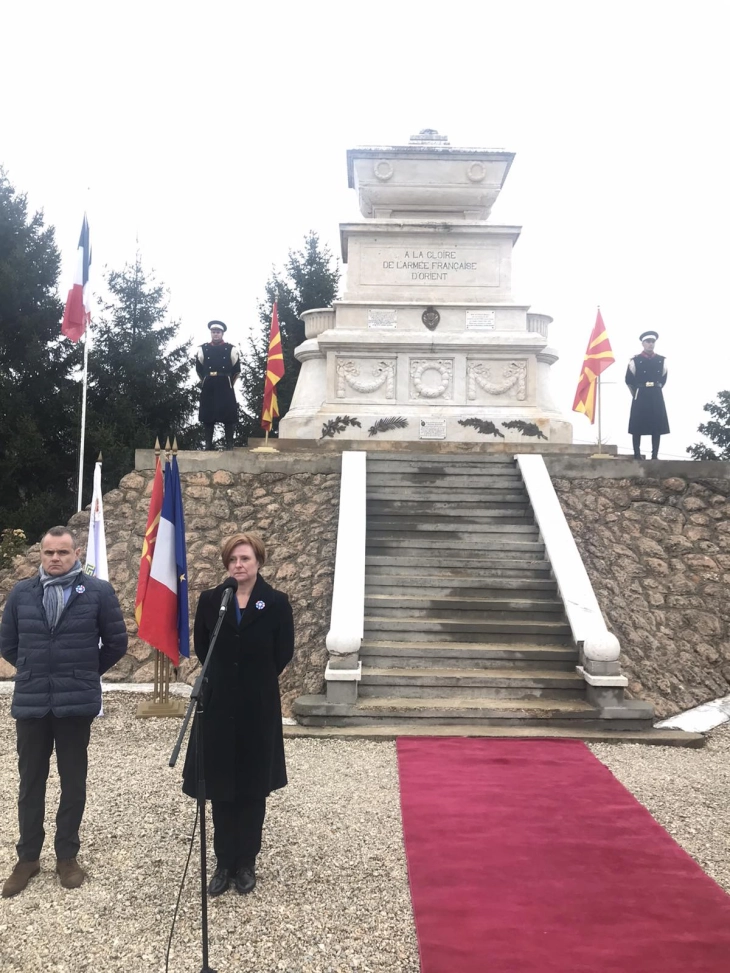Le Rigoleur: Events of Macedonian front remain relatively unknown and underrated in Western Europe
- The events of the Macedonian Front are relatively unknown in Western Europe and are often underestimated, Ambassador of the French Republic in Skopje, Christophe Le Rigoleur said at a commemoration at the French cemetery in Bitola on Thursday.

Bitola, 14 November 2024 (MIA) – The events of the Macedonian Front are relatively unknown in Western Europe and are often underestimated, Ambassador of the French Republic in Skopje, Christophe Le Rigoleur said at a commemoration at the French cemetery in Bitola on Thursday.
Ambassador Rigoleur, in remembrance of World War I and Armistice Day, noted that the civilian population should not be forgotten, as they endured immense hardship with Bitola being on the front line.
“We honor those who perished on the Macedonian Front, whether they were French, Germans, Bulgarians, Serbs, Greeks, English, Italians, or Russians. Over 300,000 French soldiers fought, and 65,000 lost their lives, to open this second front on the Balkans. The events of the Macedonian Front remain relatively unknown in Western Europe and are often underestimated; however, the battles and diseases took a heavy toll on the troops, particularly those who came from distant lands, then under French sovereignty. I am referring to the African and Indo-Chinese soldiers. This front, however, played a crucial role in the outcome of the World War I. The battle of Dobro Pole on September 14 and 15, 1918 was a decisive turning point, as it allowed for an armistice on this front, which in turn accelerated to end of hostilities of the Western Front. These cemeteries in Bitola, with their 6,000 graves and the impressive ossuary, serve as a testament to the sacrifices made by these soldiers, no matter their nationality. We must not overlook the civilian population, which suffered significantly as Bitola found itself on the front line,” Le Rigoleur underlined.

At the commemoration in Bitola, both ambassadors, French Ambassador Le Rigoleur and German Ambassador Petra Drexler, emphasized that war has returned to Europe, and thus, it is of great importance to prevent aggression and violence from dominating the European continent.
“We honor the fallen soldiers who perished in the world wars, as well as the many civilian casualties who lost their lives due to military actions, both directly and indirectly, regardless of their nationality. In an era when war has resurfaced in Europe and violent assaults and armed conflicts continue to disrupt the world, our remembrance is not only a glance at the past. Our remembrance is a duty to those who fell and a responsibility to future generations. Together, we can find the strength to embrace this responsibility, and the foundation for this is reconciliation, which France and others extended to Germany. Given the extent of the suffering that still resonates here in Bitola today, we are fully aware of the importance of reconciliation and the responsibility it entails. We must not, and will not, give up on our commitment to a world where humanity, tolerance, and respect reign,” German Ambassador Drexler said.
Delegations, including ambassadors, consuls, local government officials, and members of the Macedonian Parliament, laid flowers at the French Cemetery in Bitola on the Remembrance Day and the Armistice of November 11, 1918. The ceremony was attended by MPs Pece Milevski and Biserа Kostadinovska Stojchevska, representing the Parliament.
Photo: MIA







